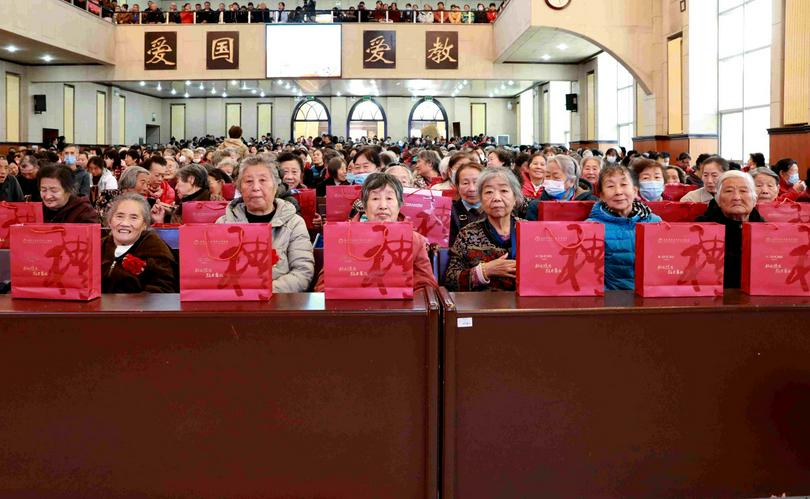Editor's note: Within the churches in China, there's an initiative honoring the elderly—"Seniors' Day," during which a variety of activities and themed worship services will be held to celebrate the Double Ninth Festival (Chongyang Festival or Senior Citizens' Day). The festival is a traditional Chinese holiday observed on the ninth day of the ninth lunar month to honor and care for the elderly. To express gratitude and love, many churches organized events such as free medical checkups, haircuts, home visits, monetary aid, foot-washing services, performances, love feasts, and the giving of gifts, demonstrating Christian compassion and filial respect in harmony with Chinese cultural traditions. The festival fell on October 29 this year.
My church has long observed a Seniors' Day. This year, nearly 120 registered members are over 80 years old, with around 90 attending the celebration. Each senior received a red flower and a gift, offering them a tangible sense of care and remembrance within the congregation while encouraging them to remain steadfast in their faith. For those unable to attend, church staff made home visits to ensure they were not overlooked.
Yet, as I became more involved in the event, a growing sense of fatigue arose in me. What should have been a celebration of faith and traditional virtues increasingly felt hollow.
This fatigue arose not only from the laborious preparations but also from witnessing the limitations of human nature. During registration, some elderly members disregarded instructions, pushing ahead without yielding to others; during the gathering, several appeared drowsy and disengaged; and during the photo session, despite repeated assurances that gifts would be kept safe, many clutched their gifts tightly, insisting on posing with them to feel secure.
Observing these frail bodies still gripped by selfishness and fear of loss left me feeling powerless. Even more troubling was that some of these seniors rarely attended church gatherings, yet arrived punctually for Seniors' Day. I could not help but wonder if gifts were not distributed next year, would they still come? As we all grow older, will we too be driven by the same anxieties?
One incident, however, profoundly changed my previous negative view of Seniors' Day. Three days after the event, I received a call about a memorial service and learned that the deceased was an 87-year-old believer. My initial thought was regret that she had not been able to attend Seniors' Day, but her family told me otherwise: she had not only attended but had passed away peacefully and contentedly shortly afterward.
Despite her frailty, her family had tried to dissuade her, yet this elderly Christian was determined to participate in the church event. With no other option, her son and daughter-in-law accompanied her to the church. During the photo session, she was exhausted but still insisted on having her picture taken with the congregation. That evening, she felt tired. She even commanded her children to pray for her before passing away peacefully three days later.
Her unwavering dedication until the very end deeply moved me. In that moment, my perception of Seniors' Day as "meaningless" was completely transformed. I realized that not all elderly attendees are attracted by gifts; what they truly long for is to return to church. Their presence is a sincere expression of steadfast faith and a deep thirst for love and grace.
I came to understand that the true significance of Seniors' Day has never been about erasing human weakness, nor about presenting the church as a "moral exemplar." Its value lies in creating a space where the elderly, despite frailty and infirmity, can feel recognized and cared for so that even amid anxiety and self-interest, they may experience God's love, strengthen their faith, and find hope in their later years.
During the visits, many seniors beamed with joy at the church's care. While taking photos, they straightened their clothes and tidied their hair; some even offered donations after receiving gifts. They listened attentively to the message that "we must remain strong in the Lord, and even if we cannot come to church, we must thirst for the Lord in our hearts."
In that moment, I came to a deep understanding of the profound significance of the church's Seniors' Day. It is reflected in the elderly's steadfast commitment to the church despite frailty, in their longing to reunite with God's family, and above all, in their gratitude and joy that surpass material concerns.
Loving the elderly does not require demanding perfection, nor does companionship need to conceal human weaknesses. When love is offered sincerely, they can experience God's presence and receive genuine joy and fulfillment through the nourishment of faith. This is the simplest yet most profound meaning of the church's Seniors' Day.
(The article was originally published by the Gospel Times, and the author is a pastor in Jiangsu.)
- Edited and translated by Poppy Chan












